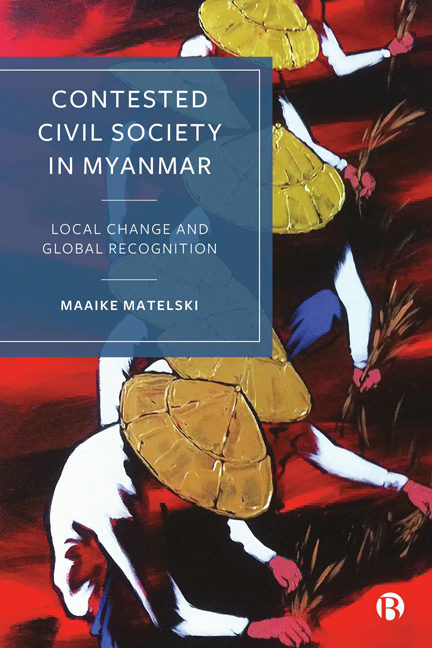Book contents
- Frontmatter
- Contents
- List of Abbreviations and Acronyms
- Acknowledgements
- Introduction: Contested Representation in Burma/Myanmar
- 1 Conflict, Repression and Resistance from Colonialism to Military Rule
- 2 Constructing Civil Society in Myanmar
- 3 Diversity and Fault Lines in Burmese Civil Society
- 4 Room to Manoeuvre under Authoritarian Rule
- 5 Transnational Advocacy Strategies and Pathways to Change
- 6 Competing Frames around the 2010 Elections
- 7 Foreign Aid and the (De)politicization of Civil Society Assistance
- 8 Interrupted Transition and Post-coup Resistance
- Conclusion
- Notes
- References
- Index
Conclusion
Published online by Cambridge University Press: 28 March 2024
- Frontmatter
- Contents
- List of Abbreviations and Acronyms
- Acknowledgements
- Introduction: Contested Representation in Burma/Myanmar
- 1 Conflict, Repression and Resistance from Colonialism to Military Rule
- 2 Constructing Civil Society in Myanmar
- 3 Diversity and Fault Lines in Burmese Civil Society
- 4 Room to Manoeuvre under Authoritarian Rule
- 5 Transnational Advocacy Strategies and Pathways to Change
- 6 Competing Frames around the 2010 Elections
- 7 Foreign Aid and the (De)politicization of Civil Society Assistance
- 8 Interrupted Transition and Post-coup Resistance
- Conclusion
- Notes
- References
- Index
Summary
This book has explored the forms and functions of organized civil society as it developed before, during and after Myanmar’s political transition period between 2011 and 2020. Starting from the pre-2010 era, when the country was relatively isolated and civil society presumed largely absent, I traced back the origins of some of the organizations and movements that became visible to outside observers in the early years of political transition. I showed that both welfare organizations and democracy activists that gained prominence in the 1990s have partial roots in forces that emerged around independence from British colonialism. The military’s top-down ‘Roadmap to Democracy’ from 2003 onwards generated opportunities for some civil society actors to engage more openly in political debates, especially around the three national elections that were held between 2010 and 2020. As this book testifies, some people in Myanmar experienced increased room to manoeuvre, while others, particularly in the ethnic areas, saw their opportunities decreasing. The military coup of February 2021 brought an end to this decade of political transition, and the resistance in response to renewed violent repression led to the emergence of a number of younger and more progressive groups that sought out new alliances both within and beyond Myanmar.
When discussing the forms and functions of civil society, this book has focused on two types of contestation. The first, which dominates the country’s modern history, is contested political power and resistance against the military, both in central Myanmar and in the ethnic border regions. The impact of over five decades of military rule on the country and its (civil) society cannot be overstated. The formally military-ruled era from 1962 until 2010 and the power struggle between the military, the people and their elected representatives which has intensified since 2021 have been characterized by widespread repression, violence and destruction of the economy and social services. A series of repressive laws, some of which stemmed from colonial times, criminalized most forms of civic association from the 1960s onwards, while organizations that continued to operate often worked under the radar and were subject to intrusive surveillance. The arbitrary application of rules and the absence of an independent judiciary made people in Myanmar subject to the whims of the military, leading to widespread fear, distrust and self-censorship.
- Type
- Chapter
- Information
- Contested Civil Society in MyanmarLocal Change and Global Recognition, pp. 157 - 165Publisher: Bristol University PressPrint publication year: 2023

